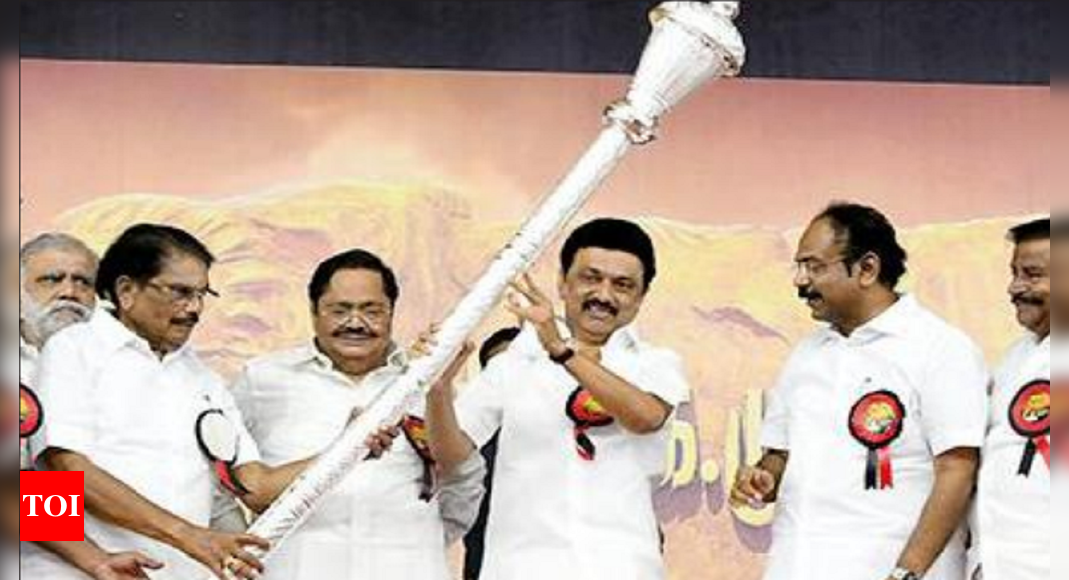


At a mass marriage event in Chennai, Tamil Nadu Chief Minister MK Stalin referenced a Tamil adage and expressed concern over the impact of the Lok Sabha delimitation exercise on family planning. He urged couples to continue giving Tamil names to their children and reminded them that the traditional saying about acquiring 16 types of wealth does not refer to having 16 children. This comes just days after Andhra Pradesh Chief Minister N Chandrababu Naidu controversially advocated for women to have more children to stabilize the population in his state.
Stalin Warns Against Misinterpretation of Tamil Adage, Calls for Family Planning Amid Delimitation
Tamil Nadu Chief Minister MK Stalin has expressed concern over the impact of the Lok Sabha delimitation exercise on family planning, citing a traditional Tamil adage.
Speaking at a mass marriage event in Chennai, Stalin urged couples to continue giving Tamil names to their children and reminded them that the saying about acquiring "16 kinds of wealth" does not refer to having 16 children.
Background
The Lok Sabha delimitation exercise, which redraws electoral constituencies based on population changes, is currently underway in India. The process has raised concerns among some politicians and activists who fear it could lead to a reduction in the number of seats allocated to states with lower fertility rates.
Tamil Nadu has traditionally been known for its lower fertility rate compared to other states in India. However, in recent years, there has been a slight increase in the number of children being born in the state.
Stalin's Concerns
Stalin argued that having more children could lead to increased economic burdens on families and hinder the state's progress. He also expressed concern that the delimitation exercise could further disadvantage Tamil Nadu if it has a lower population growth rate.
Call for Family Planning
The Chief Minister emphasized the need for responsible family planning and urged couples to space their births. He stressed that traditional values should not be misinterpreted to promote large families.
FAQs
1. What is the Tamil adage about "16 kinds of wealth"?
The adage "Patinahru Perumpattam" refers to the traditional belief that there are 16 types of wealth that bring success and happiness in life. These include knowledge, good health, wealth, friendship, courage, and others.
2. Why is Stalin concerned about the Lok Sabha delimitation exercise?
Stalin fears that the delimitation exercise could reduce the number of seats allocated to Tamil Nadu in the Lok Sabha if the state's population growth rate is lower than other states.
3. What is the current fertility rate in Tamil Nadu?
As of 2021, the total fertility rate (TFR) in Tamil Nadu is estimated to be 1.8, which is below the national average of 2.2.
4. Has the fertility rate in Tamil Nadu increased recently?
Yes, there has been a slight increase in the fertility rate in Tamil Nadu in recent years. However, it is still significantly lower than the fertility rates in many other states in India.
5. What are some of the challenges to family planning in Tamil Nadu?
Challenges to family planning in Tamil Nadu include cultural and social norms that promote large families, economic pressures, and lack of access to contraceptive services.

In a strongly worded statement, politician Shashi Tharoor expressed his opposition to the VB-G RAM G Bill that aims to replace MNREGA. Tharoor argued that the removal of Mahatma Gandhi's name from the scheme goes against its core values and also criticized other proposed changes such as financial alterations and a shift of responsibility to states. The politician believes that the Bill poses a threat to the principles of federalism and that the scheme should not be made subject to executive notification.

Union Minister Shivraj Singh Chouhan introduced the Viksit Bharat - Guarantee for Rozgar and Ajeevika Mission (Gramin): VB-G RAM G Bill, 2025 in the Lok Sabha. The bill aims to establish a new rural development framework aligned with the national vision of Viksit Bharat @2047 and seeks to provide a statutory guarantee of 125 days of wage employment to each rural household. The government is determined to pass the bill in this parliamentary session and failure to do so could complicate budgetary provisions.

In a significant move to improve academic standards, India's new Viksit Bharat Adhishthan Bill, 2025, places student feedback at the heart of higher education accreditation. Union Education Minister Dharmendra Pradhan, citing the National Education Policy 2020, announced that for the first time, students will have a direct impact on accreditation outcomes. The new framework will also increase institutional autonomy and encourage innovation, but with a strong emphasis on accountability through transparent student-led evaluations. The consolidation of regulators and accreditation bodies aims to streamline and strengthen the quality of higher education in India.

On the occasion of Vijay Diwas, a day commemorating India's 1971 victory over Pakistan, Rahul Gandhi, Leader of Opposition in Lok Sabha, paid his respects to the brave soldiers who showed indomitable courage, leading to the liberation of East Pakistan and the formation of Bangladesh. The date also marks the surrender of 93,000 Pakistani soldiers to the Indian Armed Forces and is a tribute to the bravery and sacrifice of Indian soldiers. Congress National President Mallikarjun Kharge also highlighted the 1971 victory as a great example of humanity and justice under the leadership of then Prime Minister Indira Gandhi.

Senior Congress leaders respond to Delhi court's refusal to take ED's chargesheet in the National Herald-Young Indian case, emphasizing the lack of evidence and foundation of the case. They accuse the BJP of exaggeration and targeting the opposition, claiming that the ruling has validated their long-held belief that the case is politically motivated. Congress leader Abhishek Manu Singhvi highlights the legality and commonality of corporate restructuring, while Congress general secretary K.C. Venugopal condemns the Modi government's targeting of Sonia Gandhi and Rahul Gandhi without any legal basis.

The Congress party declared a moral and legal triumph after the Delhi court dismissed the Enforcement Directorate's chargesheet in the National Herald-Young Indian case. The judge noted that the chargesheet was based on a private complaint rather than an FIR, making it legally inadmissible. The Congress accused the Modi government of maliciously targeting its leaders and misusing central agencies for political gain. They vowed to continue fighting for truth and democratic rights, asserting that nothing could deter them from their mission.

India commemorates Vijay Diwas every year on December 16 to honour the soldiers who sacrificed their lives during the 1971 war with Pakistan, which resulted in the creation of Bangladesh. As part of this year's celebrations, the Indian Army displayed a reconstructed Turkish armed drone, Yiiha, which was shot down by India during Operation Sindoor on May 10. The Kamikaze class of drones, also known as "suicide drones," were used by Pakistan to target Indian military and civilian installations, but were almost all destroyed by the Indian military.

India celebrates the 54th Vijay Diwas, honoring the bravery and sacrifice of its soldiers in the 1971 war that led to the liberation of Bangladesh. Political leaders, including Prime Minister Narendra Modi and President Droupadi Murmu, pay glowing tributes to the armed forces and their unmatched courage. The Army marks the occasion by recalling the historic triumph and the flawless coordination between different branches of the military, with an impressive Military Tattoo in Kolkata.

Renowned spiritual leader and former BJP MP, Ram Vilas Vedanti, passed away at the age of 67 due to a heart attack. Known for his significant role in the Ram Janmabhoomi movement, Vedanti had been admitted to a hospital in Rewa for a blood infection and low blood pressure. Attempts to transport him to a better medical facility were unsuccessful due to bad weather. Political leaders, including Uttar Pradesh Chief Minister Yogi Adityanath, expressed their condolences and praised Vedanti's contributions to society.

Indian Ambassador to the United Nations, Harish P, slammed Pakistan for misusing international platforms for its hostile agenda against India at the UNSC Open Debate on “Leadership for Peace”. He objected to Pakistan’s reference to Jammu and Kashmir and questioned its democratic credentials while reaffirming India’s stance on cross-border terrorism. This reflects the ongoing strain in India-Pakistan relations and New Delhi’s determination to counter any attempt by Islamabad to internationalise bilateral disputes.